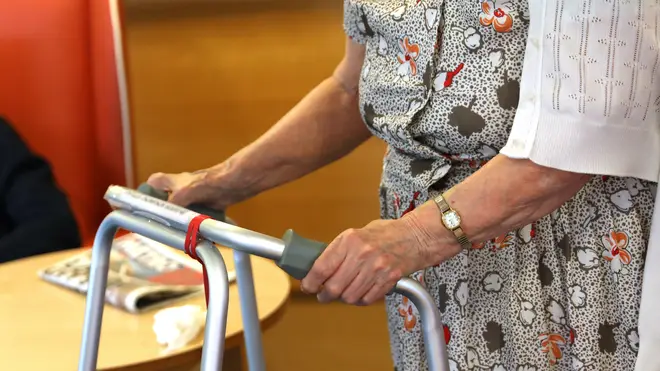
Ali Miraj 12pm - 3pm
18 March 2021, 08:01 | Updated: 18 March 2021, 19:48

More than 500 people may have had their human rights breached due to ‘do not resuscitate’ orders made during the coronavirus pandemic, the care regulator has said.
The Care Quality Commission (CQC) has called for ministers to tackle the "worrying variation" in people's experiences of do not attempt cardiopulmonary resuscitation (DNACPR) decisions.
Some families were not properly involved and others were unaware decisions had been made, it said.
READ MORE: NHS chiefs warn of 'significantly constrained' vaccine supply
READ MORE: Almost half of UK adults have now had at least one Covid-19 jab
A report added that a combination of "unprecedented pressure" on providers and "rapidly developing guidance" may have led to situations where DNACPR decisions were incorrectly conflated with other clinical assessments.
The regulator found a "worrying picture" of poor involvement of people using services, poor record keeping, and a lack of oversight and scrutiny of the decisions being made.
But it noted that the issues raised - such as the need for proper, consistent processes around timely conversations about people's care - pre-dated the pandemic.
The CQC was asked by the Department of Health and Social Care to conduct a rapid review of how DNACPR decisions were used at the start of the pandemic.

Tory peer says the country broadly should be proud of Covid response
It produced an interim report in December which found that doctors may have made blanket decisions without the input of patients or their families during the first wave of the pandemic.
The latest report includes evidence from seven Clinical Commissioning Groups (CCGs), responses from adult social care providers, a public survey and voluntary sector organisations.
Some 2,048 adult social care providers responded, and said 508 DNACPR decisions made since March 17, 2020 had not been agreed in discussion with the person, their relative or carer.
Around a third (180) were still in place in December.
And, while responsibility for making DNACPR decisions does not largely rest with adult social care providers, 119 providers said people in their care had been subject to blanket DNACPR decisions since March 2020.
The CQC said the figures raised concerns about whether the providers making these decisions were at risk of breaching the Equality Act 2010.

Iain Dale's fiery monologue on EU's behaviour in vaccine row
Most providers of adult social care, and primary and secondary care, said they were not aware of inappropriate DNACPR decisions.
But other stakeholders, service users, families and carers said blanket DNACPR decisions had been proposed locally.
The regulator heard evidence that these decisions were "quickly challenged and retracted".
One person told the CQC: "I only found out about the (DNACPR) when they were discharged from hospital; no-one had mentioned it to me before nor to the person concerned. It was a tremendous shock."
Another said: "I felt pressured to accept the decision of the doctors as they illustrated a terrible picture (i.e. immense suffering of the person) if I did not."
The CQC is calling for a ministerial oversight group to work with health and care providers, local government and the voluntary sector to deliver improvements.
Rosie Benneyworth, chief inspector of Primary Medical Services and Integrated Care at the CQC, said: "It is vital we get this right and ensure better end-of-life care as a whole health and social care system, with health and social care providers, local government and the voluntary sector working together.
"Covid-19 has brought this to the fore but these are not new issues."
An NHS spokesman said: "The NHS has repeatedly instructed local clinicians and services that the blanket DNA(CPR) decisions would be unacceptable and that access to treatment and care for people should be and is made on an individual basis in consultation with family and carers."
A DHSC spokesperson said: "It is totally unacceptable for 'Do Not Attempt CPR' orders to be applied in any kind of blanket fashion - this has never been policy and we have taken decisive action to prevent it from happening."